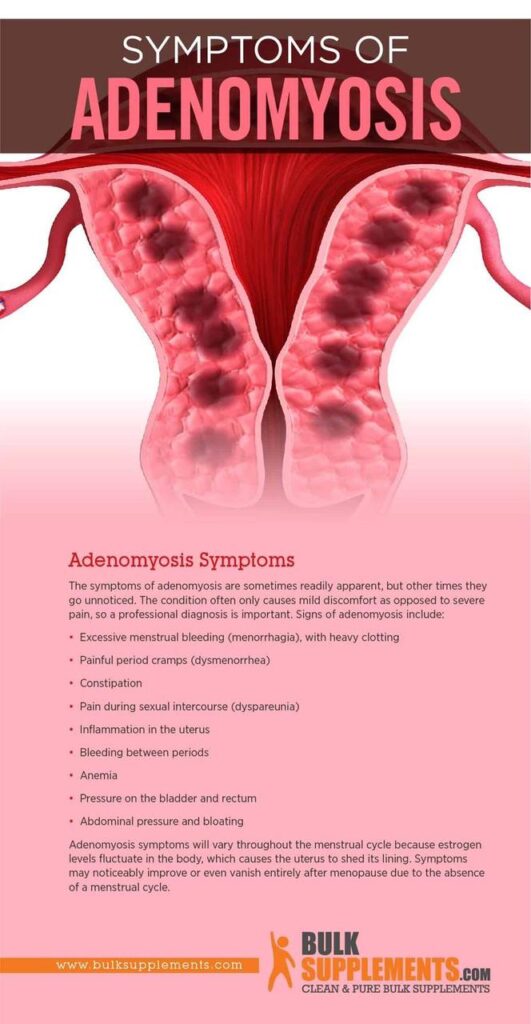Adenomyosis is a condition in which the inner lining of the uterus (the endometrium) breaks through the muscle wall of the uterus (the myometrium). Adenomyosis can be diffuse or focal and an MRI can assist in differentiating them. Diffuse adenomyosis affects a large part of the uterus, while focal adenomyosis forms a localized mass that looks like a fibroid. Adenomyosis can cause menstrual cramps, lower abdominal pressure, and bloating before menstrual periods and can result in heavy periods. In adenomyosis, endometrial cells grow within the wall of the uterus. … The uterus wall thickens, and may cause pain and heavy bleeding.

There are several theories about what causes adenomyosis. These include:
- Extra tissues in the uterine wall, present before birth, that grow during adulthood.
- Invasive growth of abnormal tissues (called adenomyoma) from endometrial cells pushing themselves into the uterine muscle — this may be due to an incision made in the uterus during surgery (such as during a caesarean delivery) or during normal uterine.
- Stem cells in the uterine muscle wall.
- Uterine inflammation that occurs after childbirth — this may break the usual boundaries of the cells that line the uterus.
The exact cause of adenomyosis is unknown. However, there are factors that put women at greater risk for the condition. These include:
- Being in your 40s or 50s (before menopause).
- Having children.
- Having had uterine surgery, such as a caesarean delivery or surgery to remove fibroids.
Adenomyosis isn’t necessarily harmful. However, the symptoms can negatively affect your lifestyle. Some people have excessive bleeding and pelvic pain that may prevent them from enjoying normal activities such as sexual intercourse. Women with adenomyosis are at an increased risk of anemia. Sometimes, adenomyosis causes no signs or symptoms or only mild discomfort. However, adenomyosis can cause: Heavy or prolonged menstrual bleeding. Severe cramping or sharp, knifelike pelvic pain during menstruation.
How Is Adenomyosis Treated?
- Anti-inflammatory medications. Your doctor may prescribe nonsteroidal anti-inflammatory drugs (NSAIDs) to relieve mild pain associated with adenomyosis.
- Hormone therapy.
- Uterine artery embolization.
- Endometrial ablation.
- Hysterectomy.
Page Source: https://www.webmd.com/women/guide/adenomyosis-symptoms-causes-treatments#1